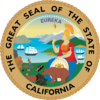Jason Potell
Jason Potell (Democratic Party) ran for election to the U.S. House to represent California's 32nd Congressional District. He lost in the primary on June 7, 2022.
Biography
Jason Potell earned a master's degree in economics from Johns Hopkins University. Potell's career experience includes founding a performing arts business.[1]
Elections
2022
See also: California's 32nd Congressional District election, 2022
General election
General election for U.S. House California District 32
Incumbent Brad Sherman defeated Lucie Volotzky in the general election for U.S. House California District 32 on November 8, 2022.
Candidate | % | Votes | ||
| ✔ |  | Brad Sherman (D) | 69.2 | 167,411 |
 | Lucie Volotzky (R) | 30.8 | 74,618 | |
| Total votes: 242,029 | ||||
 = candidate completed the Ballotpedia Candidate Connection survey. = candidate completed the Ballotpedia Candidate Connection survey. | ||||
| If you are a candidate and would like to tell readers and voters more about why they should vote for you, complete the Ballotpedia Candidate Connection Survey. | ||||
Do you want a spreadsheet of this type of data? Contact our sales team. | ||||
Nonpartisan primary election
Nonpartisan primary for U.S. House California District 32
The following candidates ran in the primary for U.S. House California District 32 on June 7, 2022.
Candidate | % | Votes | ||
| ✔ |  | Brad Sherman (D) | 53.7 | 88,063 |
| ✔ |  | Lucie Volotzky (R) | 19.7 | 32,342 |
 | Shervin Aazami (D)  | 9.2 | 15,036 | |
 | Melissa Toomim (R)  | 8.5 | 13,926 | |
 | Aarika Rhodes (D)  | 5.3 | 8,744 | |
 | Jason Potell (D) | 1.8 | 2,943 | |
 | Raji Rab (D) | 1.8 | 2,938 | |
| Total votes: 163,992 | ||||
 = candidate completed the Ballotpedia Candidate Connection survey. = candidate completed the Ballotpedia Candidate Connection survey. | ||||
| If you are a candidate and would like to tell readers and voters more about why they should vote for you, complete the Ballotpedia Candidate Connection Survey. | ||||
Do you want a spreadsheet of this type of data? Contact our sales team. | ||||
Withdrawn or disqualified candidates
- Mumin Khan (D)
Campaign themes
2022
Ballotpedia survey responses
See also: Ballotpedia's Candidate Connection
Jason Potell did not complete Ballotpedia's 2022 Candidate Connection survey.
Campaign website
Potell's campaign website stated the following:
| “ |
Immigration, Refugees and Border Security Treat all with humanity, decency and respect In our congressional district, over a third of our residents were born in other countries, and the U.S. continues to be a beacon of hope for so many. In fact, nearly 4 in 5 Californians believe immigrants are a benefit to the state because of their hard work and job skills. That’s why immigration and border security policies must uphold the highest ideals of our nation by treating all people, citizens and non-citizens alike, with humanity, decency, and respect. Enact comprehensive immigration reform, including a better path to citizenship Thousands of Americans currently live in fear of financial ruin or even deportation due to Congress’ continued failure to act to protect DACA recipients and DREAMers. These people are our neighbors, students at our colleges, parents of our kids’ friends. Some have served in our country’s military, and others have served our communities as first-responders. Those who qualify have certainly earned and deserve a clear accessible path to citizenship. Fully fund our immigration system to accurately reflect its needs and realities The United States is failing to uphold the highest ideals of our nation as we refuse asylum seekers at our borders, continue to separate families, and struggle to live up to our commitments to our Afghan allies. The federal Office of Refugee Resettlement now includes refugees, asylum seekers, and victims of human trafficking. As their mission has expanded, their funding has not.
Housing is a human right Across the political spectrum, Angelenos near-unanimously agree that the state of homelessness here is out of control. Some people are disheartened by the slow pace of progress, others by our elected leaders’ lack of urgency. The bottomline is that housing is a human right, and we must work creatively and collaboratively to ensure no Angeleno has to sleep on the street. Healthy and safe neighborhoods This humanitarian crisis also includes frustrations and fears of residents and business owners who feel they have lost parks, sidewalks, and livelihoods due to the growing number of encampments. Our children deserve their parks. Our families deserve to feel safe as they walk around their neighborhoods and cities. Taking action to solve problems This is a complex problem that involves not just homelessness services, but healthcare; not just affordable housing, but job training programs; not just economic growth, but drug treatment programs. I am committed to bringing all levels of government as well as the many organizations and residents already dedicated to addressing these crises together. We can do this.
Supporting small businesses Small businesses are the economic lifeblood of Los Angeles and the Valley. In CA-32 alone we had 27,916 small businesses and 185,357 small business employees before Covid. Like so many Americans and Angelenos, I lost my own small business as a result of covid. I understand what it feels like to pour everything you have into building a business, only to see it suddenly lost. We must do a better job of supporting small businesses through federal assistance that actually targets them rather than major corporations, especially in the short-term, as well as a simplified tax code and expanded job training programs in the long-term.
Climate change is here, it’s real, and it is caused by human activity With the clearest words to date, the 2021 Intergovernmental Panel on Climate Change report opened with the line: “It is unequivocal that human influence has warmed the atmosphere, ocean and land. Widespread and rapid changes in the atmosphere, ocean, cryosphere and biosphere have occurred.” This, for better or worse, is not news to most Californians. We are already experiencing climate change’s impacts. Hotter temperatures and drier weather are a major contributor to our ever-worsening wildfires. Those factors, combined with decreasing snowmelt in the mountains, is a direct cause of our drought conditions. Drought, in turn, can increase stress loads on the Earth’s crust, which could lead to heightened risk of earthquakes. Thankfully, public opinion has turned in support of addressing climate change on a broad scale. 83% of voters are concerned that future generations will be more impacted by extreme weather events in their lifetimes compared to today, and a majority of voters believe that Democrats in Congress should use their majority to make investments in climate and clean energy. Green new deal Modeled after FDR’s New Deal that fundamentally transformed our nation and helped build a robust middle class, the Green New Deal aims to do the same, but specifically through a lens of addressing climate change and economic injustice. Broadly, Americans support this approach, just as I do, including 83% of Democrats, 57% of Independents, and even 36% of Republicans. It is critical to note though, that the Green New Deal is an approach to addressing climate change and a framework of understanding how we can solve it, but is not an actual, single bill. Currently, Congress is exploring a variety of Green New Deal-related bills, including: Resolution to Create a Green New Deal, Green New Deal for Cities Act, Green New Deal for Public Housing Act, and Civilian Corps for Jobs and Justice Act. We must take immediate action, and supporting these legislative vehicles is a great way to start making the changes Earth is demanding. Policy priorities First, we should acknowledge that the effects of climate change often hit poorer citizens much more than affluent ones. Given that, some specific Green New deal and climate change related policies that I would prioritize include: Disincentivizing carbon pollution and supporting low-income households through a combination carbon tax and rebate program. While a carbon tax can be an effective way to reduce greenhouse gas emissions, it is all too easy for polluters to transfer any cost increases to consumers. By directing the revenue from such a tax to our most vulnerable citizens, we can offset this cost increase for them. Leveraging a public-private approach to finance the Green New Deal, through the creation of an independent civil authority. One of the major challenges of addressing climate change is that due to our delay, the costs are astronomical, with some estimates for putting in place every idea within the Green New Deal costing anywhere from $10 to $93 trillion. While some naysayers see this as an argument against the Green New Deal, the reality is that this is something we can’t afford not to do. Putting professional scientists, economists, and environmentalists in charge of evaluating “green” projects that need funding. I do not believe that financing the Green New Deal solely with taxpayer money is either feasible or wise. Such a massive investment would require buy-in from future Congresses and administrations, making a fully public-funded approach only tenuously sustainable at best. Furthermore, these professionals are better suited to quickly adapt to changing technologies and strategies. The scope of the Green New Deal is massive, and these are just a few examples of ways that we can make that scope a reality. Regardless of the specific policy, we must keep in mind that the purpose is to build a cleaner, more affordable country that lifts up all our people, and builds a world that will be a home for generations to come.
We’ve been here before, sort of As any Angeleno can attest to, California is under constant threat of water shortages. This has certainly been made worse in recent years by climate change’s triple threats of rising temperatures, lower rainfall and decreasing snow melt. That said, on August 16, 2021, the U.S. Bureau of Reclamation officially declared a first-ever water shortage for the lower Colorado River Basin, a critical source of water for California and other Southwestern states. One day later, the Metropolitan Water District of Southern California issued a supply alert. Californians have proven we have the ability to conserve water, as residents and industries alike have made improvements. But we are entering unprecedented territory. Needed steps The burden cannot rest solely on the shoulders of home water usage when 80% of California’s water is used in agriculture. Similarly, while there are steps every person can take to fight climate change, the scope of this crisis demands federal action on a large scale. That is why I support the Green New Deal to address the environmental factors that are contributing to increasing water shortages. However, there are also significant steps we can take on a smaller scale. I support:
Cooperation or conflict Our policymakers must also be prepared to navigate a series of potentially contentious negotiations about water usage. One major example is the renegotiation of the usage agreement, which provided guidelines for water usage and conservation, among the seven states that rely most on the Colorado River Basin that is set to expire in 2025. Another example is how the U.S. Bureau of Reclamation declaration warns that decreasing water flow is likely to trigger a legally mandated consultation between the U.S. Secretary of the Interior and representatives from California, Arizona, and Nevada to improve conservation. These will not be simple discussions. As a member of Congress I will do everything I can to ensure both that my constituents’ water needs are addressed, and that all discussions are carried out through the lenses of climate change and racial justice.
Supporting innovation America is a land of people unafraid to go where others have not yet gone, to take chances others may not. Today, new technological approaches such as blockchain and cryptocurrency are opening up terrific possibilities for fairer, faster and more empowering ways to communicate, collaborate, and conduct commerce. Unfortunately, lobbying from large financial institutions and ill-informed elected officials has resulted in fearful, misguided policymaking. We need a legislative and regulatory environment that supports investment and innovation, not stifles them. A new framework In 1997 President Clinton released Framework for Global Electronic Commerce, a policy document designed to support the Internet’s development and integration with world commerce. Without this approach when the Web was just beginning, there would be no Silicon Valley as we know it today, and Americans would have been watching from the sidelines as the rest of the world raced past us. This is the same approach we should be taking with crypto, blockchain, and related technologies. As of August 2021, the bipartisan infrastructure bill included a disappointing, misguided provision installing unrealistic reporting requirements on the crypto industry. As a member of Congress, I will fight against policies like this provision. Furthermore, I will push for the development of an analogous “Framework” for the crypto and blockchain space. A home for pioneers Many of the greatest minds in crypto, blockchain, and related technologies either grew up in America or found their way here, drawn by our economic strength and freedoms. But today, those same innovators are being chased away. Even some projects that were started here have relocated to a country with a more forward-thinking government. We are on the verge of yet another revolution in communication and industry that will enable us, both as individuals and communities, to better meet the challenges we face. For example, cryptocurrencies are revolutionizing the world of remittances, which are particularly important to immigrant communities. Crypto can also expand capital market access to traditionally underserved populations, such as Black, Latino, and LGBTQ investors.[2] |
” |
| —Jason Potell's campaign website (2022)[3] | ||
See also
2022 Elections
External links
Footnotes
- ↑ Potell for Congress, "Meet Jason," accessed June 11, 2022
- ↑ Note: This text is quoted verbatim from the original source. Any inconsistencies are attributable to the original source.
- ↑ Potell for Congress, “Home,” accessed May 25, 2022







